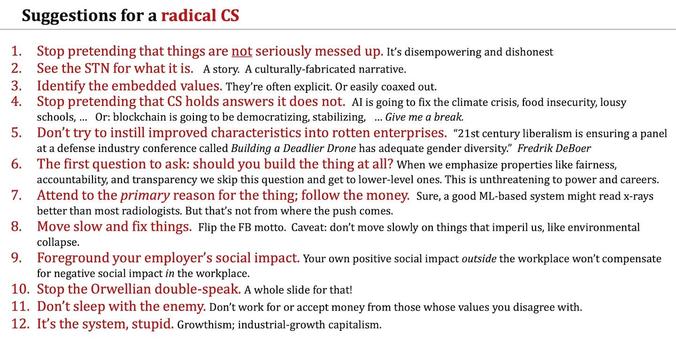2026-01-19 02:17:33
Maybe that’s alarming to you, but you think we can still coast through it, wait it out. OK. Fine.
Maybe your red line is US troops gunning down civilians. Like Tiananmen Square. Like Iran this past week. That has not happened under the Trump regime yet. That is a horrifying red line — but maybe it is •your• red line.
Wherever it is, I am asking you now, from my home in Minneapolis, to think: what is •your• red line, the place where you think, “This is too much. Normal is gone. Life as I knew it has to stop until this ends.”
5/
2026-01-19 00:32:01
"Let's just…admit…if your wrists get in the way of ICE zip ties, if your lungs dare to breathe…our chemical weapons without written permission in advance, or if your body and face get in the way of ICE munitions, that was illegal of you. So if you're really honest with yourself, you deserved it and have no one to blame but yourself. People who follow laws don't get targeted by ICE, as being a target is a clear indication of criminality on the part of the target."
…
2025-11-20 14:44:16
It is cold in northern parts of the world. Studded tyres are awesome. If you do not have them, forgot to mount them or cannot afford to invest for your usage, I am here for you.
The number of times I have been caught out and unicycled on snow and ice is quite high. If I can do it, you can do it. Just take it easy! Oh and wear a helmet, even if you do not normally. That kind of a fall is exactly what they are for.
2026-01-18 23:17:10
In case anyone was wondering about the relevance of #LandBack in the current moment, via CrimeThinc an article on the Minneapolis resistance states:
"""
The Whipple, a federal building in Fort Snelling on the outskirts of the Minneapolis and St. Paul, has long been a regional headquarters for ICE, having previously housed other federal agencies. The complex is located across the street from a National Guard base, down the road from a military base, and next to the preserved fort itself. The fort sits on the sacred site of the convergence of two rivers. It was one of the earliest sites of colonization in the area; at one time, it was a concentration camp holding native Dakota people.
"""
If at any point in the past you ever felt that maybe Native soverignty was a niche issue, or so far from being realized that other causes were more important or relevant, things like this are a good reminder that that cause: overturning the colonial order, is the *same* cause as any meaningful change from the fascist status quo. Things like a "return to democracy" aren't necessarily bad, but the rot runs to the root of this nation, and any intervention that doesn't go that deep is going to leave us right back in this situation again later on.
The fact that ICE is detaining Native Americans is not at all a mistake given their white supremacist aims.
Article link: #ICE #LandBack
2025-11-19 19:20:55
Here’s my 35th “Long Links” outing, curation of long-form offerings, which assume that nobody has time to read all this stuff but one or two of the pieces might brighten your day. This one is mostly political but some of the politics are from France and China. Plus a way-cool analytical history of blogging and a section labeled “wonderful things”.
 @axbom@axbom.me
@axbom@axbom.me2026-01-19 10:10:17
2025-11-19 20:13:58
I think there is just as much chance of Half-Life 3 launching as there is of the rapture happening. Plot twist: I don’t see either happening.
https://www.ign.com/articles/why-is-everyone-posting-about-a-half-life-3-announcement-soon
2025-11-18 16:37:45
wow as a hoarder er keeper of all the things :-) this is amazing
https://tomkahe.com/@GiftArticles/115563308736409551
2025-12-19 21:25:20
2025-12-18 17:03:18
Something that just drives me up the wall about this particular area of Git (merge conflicts) is that, beyond the all-too-typical Git problem of sloppy terminology, this is bad feature design. In most situations, “use ours” and “user theirs” are •both• the wrong answer! There are two doors, and they’re •both• trapdoors.
If you have a merge conflict, that means that you changed something •and• somebody else changed something, and your job is to •synthesize• both changes. To use one is to discard the other, which is usually not what you want!
The thing Git (and every Git GUI) ought to surface is a three-way merge: show me what I changed and what they changed ••relative to the nearest common ancestor••. Yes yes yes, I know it’s possible to finagle that into view with Git. It should be the danged default. It is what I should see first. It is what I should see if I have no idea what I’m doing.
1/ https://hachyderm.io/@jeremydmiller/115741417416659492






